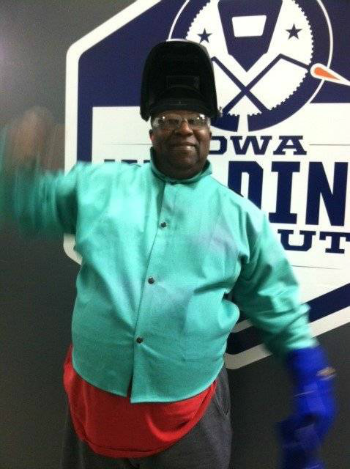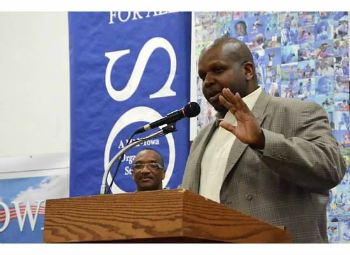February 2014
Innovation and Collaboration – An Integrated Approach to Workforce Development
One of the most effective ways to end hunger is through adequate employment for the breadwinners in every family. Project IOWA works to increase access to 21st century, career track, living wage jobs for chronically under-employed and unemployed residents of Central Iowa through an intensive public-private skills training and economic development program. Since February 2012, 112 central Iowans have participated in Project IOWA’s education programs, with 75% accepting living-wage positions (at least $13.66/hr with opportunities for advancement) with area businesses. The job retention rate for Project IOWA graduates is 87%.
 Three factors feature prominently in Project IOWA’s early successes:
Three factors feature prominently in Project IOWA’s early successes:
1) Project IOWA's origin in a model of community organizing that emphasizes building relationships over the long-term.
2) The support of central Iowa businesses, who advise on which technical skills are most desirable in the workforce, are a source of volunteer trainers, and agree to interview program graduates.
3) Project IOWA's workforce development approach, which combines technical skills training with a soft-skills curriculum that emphasizes emotional intelligence, communication, and workplace behavior expectations.
Relational Organizing
The concept of Project IOWA was born from a series of community listening sessions held by AMOS, a community organizing network that emphasizes “relational organizing”, in which change is created through building public relationships between citizens with diverse interests and backgrounds. The need for career track, living wage jobs was a common theme at these sessions, which led AMOS members to convene with important community stakeholders about the feasibility of a job-training program modeled off of the Industrial Area Foundation’s Project Quest. Area businesses supported the concept, which led to the creation of Project IOWA in September of 2011.
Partnerships with the Business Community
The early and ongoing support of central Iowa businesses has been critical to the successes of Project Iowa. Graduates have been hired by Bridgestone, ALMACO, Vermeer, Danfoss, EFCO, , ACH, Mercy and Unity Point. Up-front work with the business community helped Project Iowa determine which skill sets are currently in need and influenced the development of the skills training curriculum. Several companies have joined as hiring partners based on feedback from their existing employees who volunteered as skills mentors or attended showcases, in which Project Iowa participants practice resume and interview skills.
 Integrated Technical and Soft Skills Training
Integrated Technical and Soft Skills Training
Project IOWA combines technical skills trainings with a soft-skills curriculum in the context of a relationship-based approach to workforce development. Technical skill trainings are offered based on what area businesses need, and currently include welding, certified production technician, and certified nursing assistant classes. Soft-skills trainings use a “Vision, Initiative and Perseverance (VIP)” curriculum that emphasizes goal setting, emotional management skills, communication skills, workplace behavior and expectations, and resume-writing and interviewing.
During the 12-16 week program, cohorts of 12 participants meet 3 nights per week for technical skills and one night per week for soft skills. The classes work synergistically, with technical skills trainings providing a context for developing soft skills and the soft skills classes providing an opportunity to work through workplace situations that develop during the technical skills trainings.
Instructors intentionally develop tension and unfair situations in the classes in order to simulate and work through challenges commonly encountered in the workplace. Although influenced by the sanctuary model of trauma-informed care, soft-skills classes are not therapy. Rather, they focus on why participants sometimes react to workplace situations in unproductive ways, with the philosophy that understanding plus practice leads to change.
The relational emphasis of Project IOWA begins with recruitment interviews, in which applicants’ abilities, skills, career goals and barriers are discussed. Applicants whose goals would be better addressed by other programs are given referrals. The relational focus continues after graduation, with participants receiving ongoing support or up to a year and continuing contact with employers about placements. Project IOWA and Goodwill Industries are now partnering to provide employment placement and retention services.
Project IOWA is about graduation not just an education, and creates opportunities that produce life changing transformation. Their contact information is available on their Iowa Hunger Directory profile.
Tools of the Trade: How-To Guides and Templates for Project Management
Tools4dev is a website (www.tools4dev.org) with a collection of free how-to guides and templates that provide guidance on many aspects of project management. This collection includes strategic plans, project proposals, job descriptions, budgets, monitoring and evaluation, research reports, and logical frameworks. Guides and templates are presented in a way that is accessible to those without advanced professional training, while remaining detailed enough to be useful to professionals. Tools4dev is especially useful for people working to end hunger abroad.
Photo Credits: Top: Mr. Tommy English, Project IOWA participant, Bottom: Mr. Robert Hobbs (left) and Mr. Clifford Salmond (right), Project IOWA graduates now employed at EFCO and Bridgestone

